Lexus NX vs VW Transporter Transporter – Differences & prices compared
Compare performance, boot space, consumption and price in one view.
Find out now: which car is the better choice for you – Lexus NX or VW Transporter Transporter?
The Lexus NX (SUV) comes with a Full Hybrid or Plugin Hybrid engine and Automatic transmission. In comparison, the VW Transporter Transporter (Cargo Van) features a Diesel, Plugin Hybrid or Electric engine with Manuel or Automatic transmission.
When it comes to boot capacity, the Lexus NX offers 545 L, while the VW Transporter Transporter provides – depending on how much space you need. If you’re looking for more power, decide whether the 309 HP of the Lexus NX or the 286 HP of the VW Transporter Transporter suits your needs better.
In terms of consumption, the values are 1 L per 100 km for the Lexus NX, and 21.90 kWh7.10 L for the VW Transporter Transporter.
Price-wise, the Lexus NX starts at 45200 £, while the VW Transporter Transporter is available from 37500 £. Compare all the details and find out which model fits your lifestyle best!
Lexus NX
The Lexus NX embodies a sophisticated blend of striking design and luxurious comfort, providing an exceptional driving experience. Its hybrid powertrain offers seamless performance, ensuring both efficiency and a smooth ride. Inside, high-quality materials and innovative technology create an atmosphere of modern elegance and convenience.
details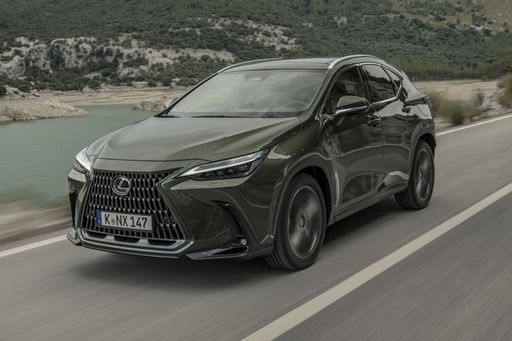 @ toyota-media.de
@ toyota-media.de
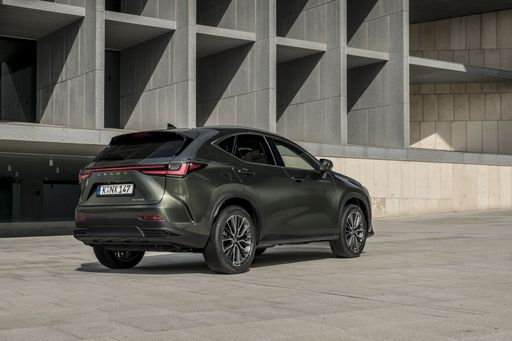 @ toyota-media.de
@ toyota-media.de
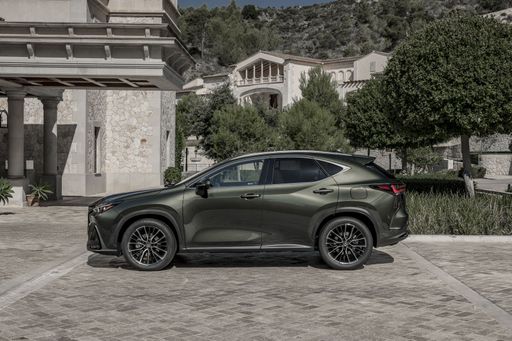 @ toyota-media.de
@ toyota-media.de
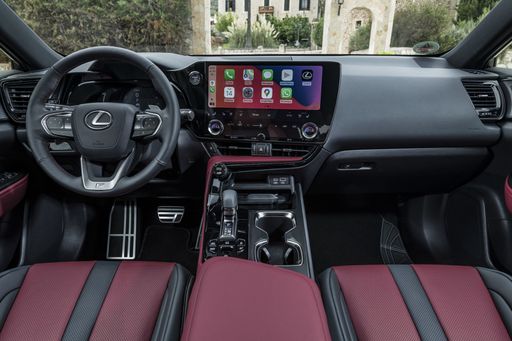 @ toyota-media.de
@ toyota-media.de
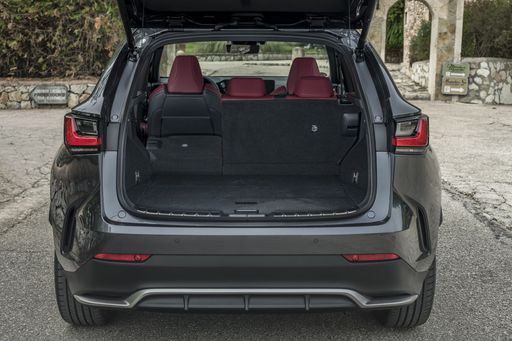 @ toyota-media.de
@ toyota-media.de
VW Transporter Transporter
The VW Transporter, a versatile favourite among commercial vehicles, combines practicality with modern design. Its spacious interior offers ample room for both passengers and cargo, making it a reliable choice for businesses and families alike. The vehicle's strong build and advanced technology ensure a smooth and efficient driving experience in various conditions.
details

|
|
|
|
|
Costs and Consumption |
|
|---|---|
|
Price
45200 - 63400 £
|
Price
37500 - 60800 £
|
|
Consumption L/100km
1 - 6 L
|
Consumption L/100km
7.1 - 8.4 L
|
|
Consumption kWh/100km
-
|
Consumption kWh/100km
21.9 - 24.4 kWh
|
|
Electric Range
68 km
|
Electric Range
56 - 331 km
|
|
Battery Capacity
-
|
Battery Capacity
11.8 - 63.8 kWh
|
|
co2
22 - 135 g/km
|
co2
0 - 220 g/km
|
|
Fuel tank capacity
55 L
|
Fuel tank capacity
55 L
|
Dimensions and Body |
|
|---|---|
|
Body Type
SUV
|
Body Type
Cargo Van
|
|
Seats
5
|
Seats
2 - 5
|
|
Doors
5
|
Doors
4 - 5
|
|
Curb weight
1805 - 2065 kg
|
Curb weight
1872 - 2462 kg
|
|
Trunk capacity
545 L
|
Trunk capacity
-
|
|
Length
4660 mm
|
Length
5050 - 5450 mm
|
|
Width
1865 mm
|
Width
2032 mm
|
|
Height
1670 mm
|
Height
1966 - 1985 mm
|
|
Payload
475 - 515 kg
|
Payload
755 - 1259 kg
|
Engine and Performance |
|
|---|---|
|
Engine Type
Full Hybrid, Plugin Hybrid
|
Engine Type
Diesel, Plugin Hybrid, Electric
|
|
Transmission
Automatic
|
Transmission
Manuel, Automatic
|
|
Transmission Detail
-
|
Transmission Detail
Manual Gearbox, Automatic Gearbox
|
|
Drive Type
All-Wheel Drive, Front-Wheel Drive
|
Drive Type
Front-Wheel Drive, All-Wheel Drive, Rear-Wheel Drive
|
|
Power HP
244 - 309 HP
|
Power HP
110 - 286 HP
|
|
Acceleration 0-100km/h
6.3 - 8.7 s
|
Acceleration 0-100km/h
7.4 - 16.9 s
|
|
Max Speed
200 km/h
|
Max Speed
112 - 150 km/h
|
|
Torque
-
|
Torque
310 - 415 Nm
|
|
Number of Cylinders
4
|
Number of Cylinders
4
|
|
Power kW
179 - 227 kW
|
Power kW
81 - 210 kW
|
|
Engine capacity
2487 cm3
|
Engine capacity
1996 - 2488 cm3
|
General |
|
|---|---|
|
Model Year
2024
|
Model Year
2025
|
|
CO2 Efficiency Class
D, B
|
CO2 Efficiency Class
G, A
|
|
Brand
Lexus
|
Brand
VW
|
Lexus NX
An Introduction to the Lexus NX: A Technological Marvel
The Lexus NX, a stunning SUV, has made a name for itself in the competitive automotive market with its blend of striking design, advanced technology, and impressive performance. From hybrid innovation to state-of-the-art features, the NX line-up continues to reflect Lexus's commitment to luxury and efficiency.
Powertrain Innovation: Hybrid Technology at Its Best
One of the standout features of the Lexus NX is its hybrid drivetrain. Offering both full-hybrid and plug-in hybrid models, the NX showcases Lexus's ongoing commitment to reducing emissions while maintaining performance. The full-hybrid variant boasts 244 PS, combining efficiency with dynamic driving experience. Alternatively, the plug-in hybrid model provides a total of 309 PS and an economical fuel consumption rate of just 1 L/100km, with an electric-only range of up to 68 km, perfect for emission-free urban commutes.
Performance Specs: Speed and Comfort Combined
The Lexus NX doesn't compromise on performance. With a top speed of 200 km/h, it accelerates from 0 to 100 km/h in a brisk 6.3 to 8.7 seconds, depending on the model. The SUV maintains a respectable and eco-friendly fuel consumption range of 1 to 6 L/100km, emphasising its capability as both a powerful road vehicle and an environmentally conscious choice.
Design and Dimensions: A Perfect Blend of Space and Style
Measuring 4660 mm in length, 1865 mm in width, and 1670 mm in height, the Lexus NX offers a spacious and comfortable ride without compromising on style. The interior provides ample space with a generous boot capacity of 545 L, perfect for those long journeys with family or friends.
Advanced Features: Luxury and Safety at the Forefront
Lexus prioritises safety and luxury, evident in the NX's comprehensive array of features. Equipped with the latest CVT gearbox, the NX ensures a smooth and efficient ride. The adaptive front-lighting system, pre-collision system, and lane departure alert are just a few of the advanced safety features available, providing peace of mind on every journey.
Efficiency and Affordability: Balancing Cost and Value
The Lexus NX is not only a powerhouse of luxury and efficiency but also an economically viable option. With CO2 emissions ranging from 22 to 135 g/km, the NX models fall into favourable efficiency classes (D to B), allowing potential savings in environmental taxes. Furthermore, its monthly running costs are estimated between €1,330 and €1,631, offering excellent value for such an advanced vehicle.
Conclusion: The Lexus NX - Where Innovation Meets Elegance
The Lexus NX proves to be a strong contender in the premium SUV segment, showcasing a compelling mix of innovation, performance, and luxury. Its advanced hybrid technologies, sleek design, and spacious interior make it an attractive option for those seeking a vehicle that aligns with both their environmental consciousness and their desire for luxury. Lexus continues to set a high benchmark in the automotive industry, making the NX a worthy choice for modern drivers.
VW Transporter Transporter
Revolutionizing Utility: The VW Transporter T7
The latest iteration of the VW Transporter, known widely as the Transporter T7, marks a significant evolution in utility vehicle design and functionality. As a mainstay in the VW lineup, the Transporter T7 comes with a plethora of options, ensuring that it meets a variety of professional and personal needs.
Diverse Models to Fit Every Need
For 2025, the VW Transporter T7 is available in multiple configurations, ranging from efficient diesel engines to innovative hybrid systems. The conventional models are powered by a 2.0 TDI diesel engine, offering three power outputs: 110 HP, 150 HP, and a vigorous 204 HP. For those seeking a more sustainable option, the 2.5 eHybrid model provides a combined power output of 233 HP with an electric range of 56 km, thanks to its 11.8 kWh battery.
Innovative Technical Aspects
Underpinning the technical innovations of the Transporter T7 is VW's dedication to cutting-edge engineering. The diesel engines provide torque ranging from 310 Nm up to 390 Nm, ensuring robust performance across the lineup. Moreover, the T7 offers configurations with either manual or automatic gearboxes, catering to different driving preferences.
The availability of front-wheel drive and the 4MOTION all-wheel-drive system across the range enhances versatility, allowing the Transporter T7 to tackle various terrains with ease. With body lengths extending to 5450 mm and a payload capacity of up to 1259 kg, the Transporter T7 stands as a paragon of practicality for transporting goods or accommodating passengers.
Comfort and Design Revolution
Beyond performance, the VW Transporter T7 has been designed with driver comfort and ergonomic efficiency in mind. The cabins offer ample seating configurations, supporting both two-seat and five-seat layouts. The inclusion of modern conveniences elevates the driving experience, making long hauls more manageable and stress-free.
The exterior dimensions, with a width of 2032 mm and a height up to 1969 mm, marry the classic robust design with a contemporary touch, making the Transporter T7 a visual centerpiece in any fleet.
Economical and Environmental Impact
Economic efficiency is another critical aspect of the VW Transporter T7's design philosophy. With diesel fuel tank capacities between 55 and 63 liters, and an emphasis on improving mileage with each engine variant, operational costs are kept at a minimum. Additionally, the eHybrid model not only offers environmental benefits but also presents substantial savings on fuel through its electric range capability.
Conclusion: The Transporter T7 Legacy Continues
The VW Transporter T7 furthers the legacy of its predecessors by combining practicality, innovation, and eco-friendliness. Whether utilized for business in its cargo van capacity or adapted for personal use with seating comforts, the Transporter T7 is set to remain a critical player in the automotive sector, pushing the boundaries of what a multi-purpose van can achieve.
The prices and data displayed are estimates based on German list prices and may vary by country. This information is not legally binding.
